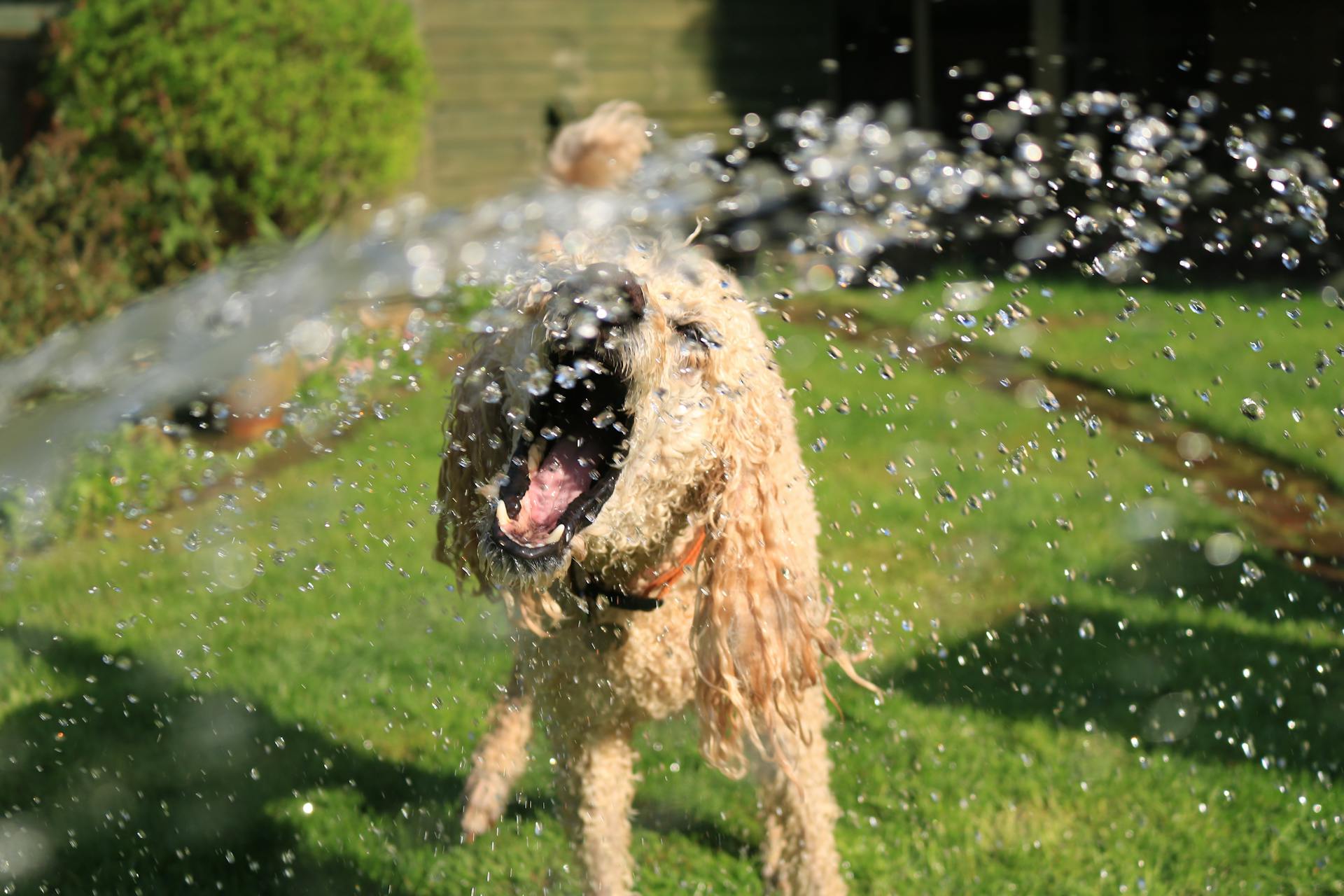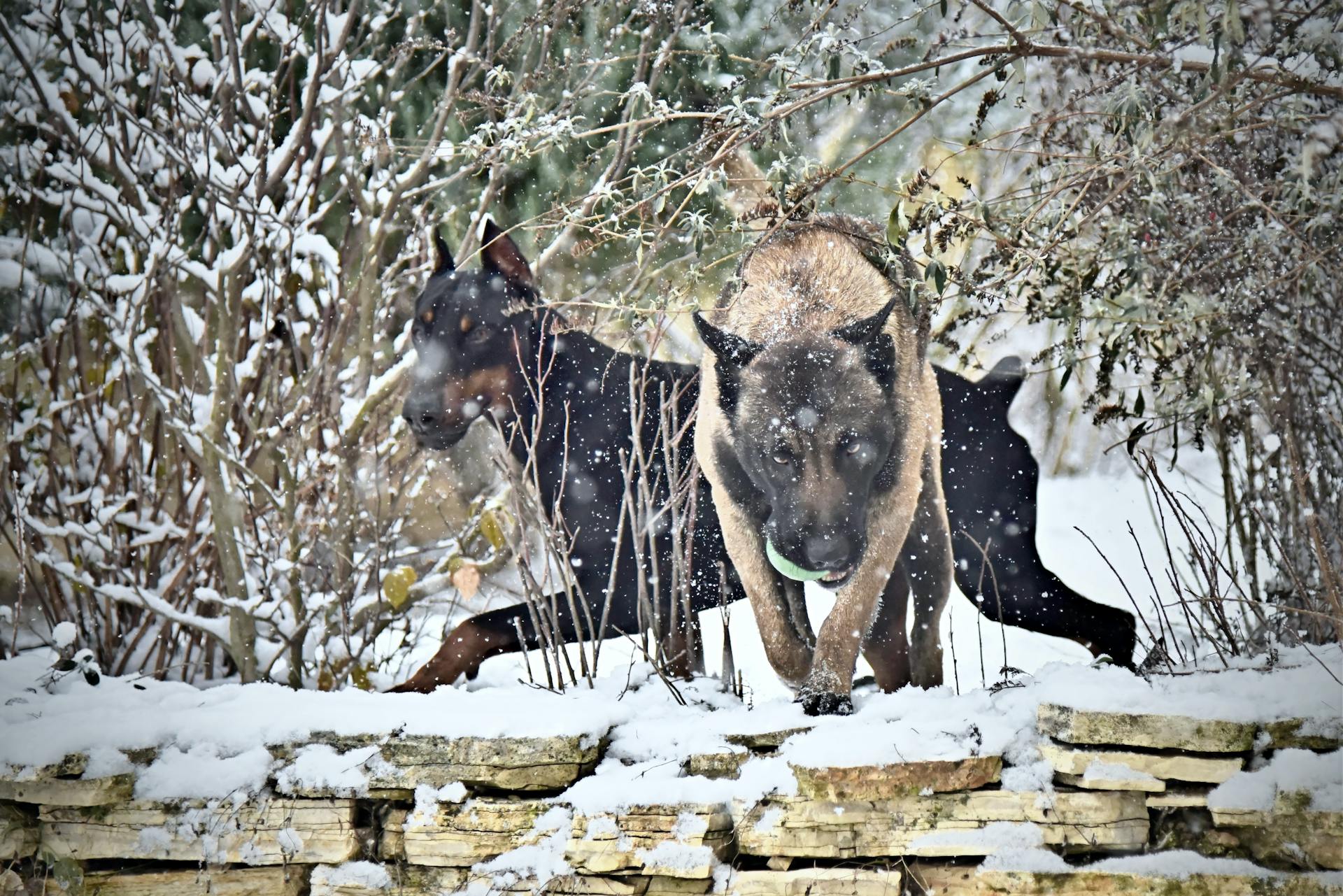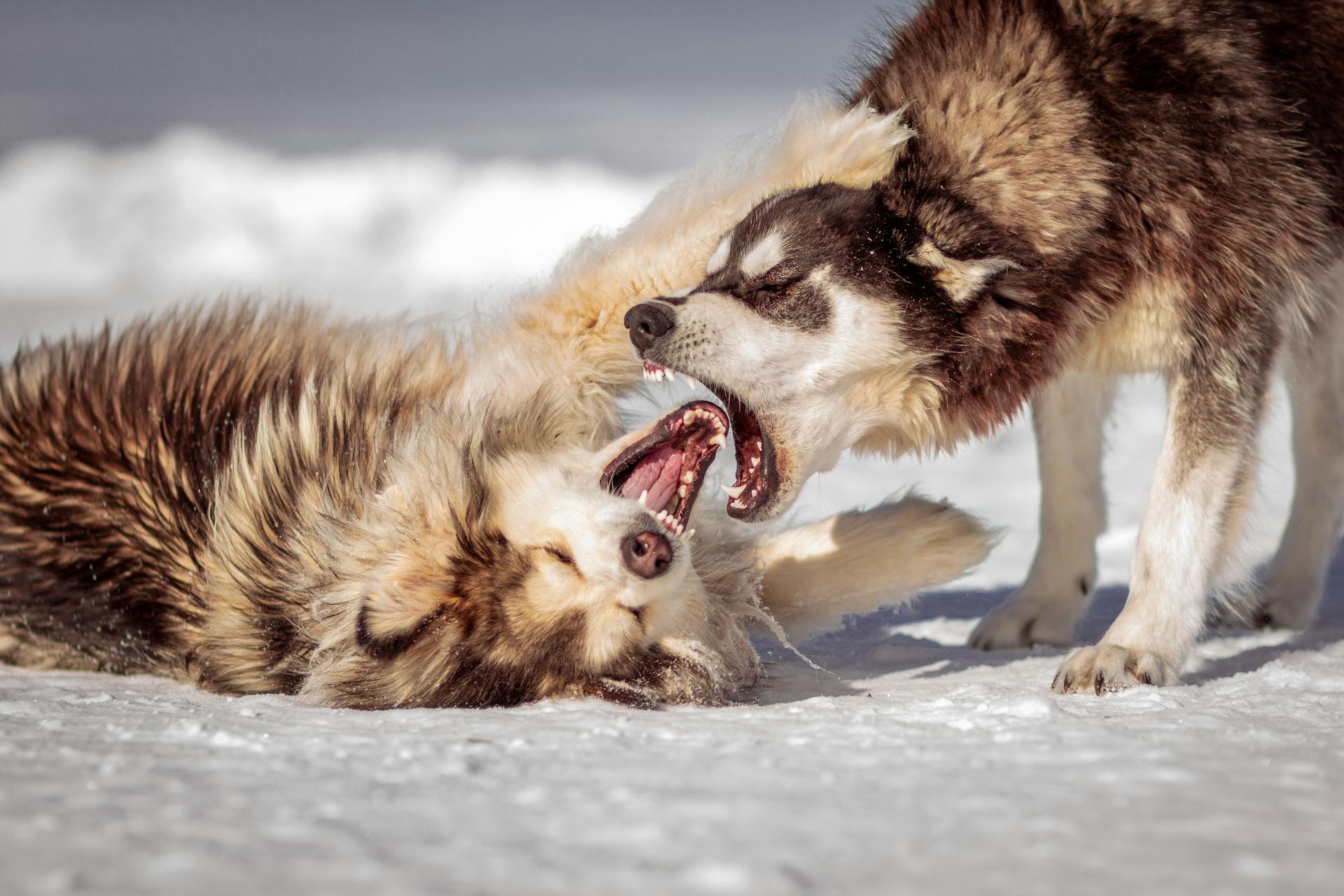
Dogs' eyes watering is a common issue that can be caused by a variety of factors, including allergies, irritants, and even infections.
In some cases, a dog's eyes may water due to a condition called conjunctivitis, which is an inflammation of the thin membrane covering the white part of the eye.
If you notice your dog's eyes watering excessively, it's essential to take them to the vet to rule out any underlying conditions.
Dogs with allergies may experience tearing in their eyes as their immune system reacts to allergens like pollen, dust, or mold.
If this caught your attention, see: How to Get Water Out of Your Dog's Ear?
Causes of Watering Eyes
Dogs can experience watering eyes due to various reasons, some of which are related to their breed. Certain breeds, such as Poodles, Shih Tzu, and Pekingese, can have watery eyes due to their genetic makeup, with no obvious irritants.
Some common causes of watering eyes in dogs include allergies, eyelash abnormalities, and eyelid issues. Allergies can be caused by pollen and dust, which are common eye irritants. Eyelash abnormalities, such as ingrown eyelashes or eyelashes growing from an abnormal spot, can also cause irritation and watery eyes.
For more insights, see: How Common Is Pyometra in Dogs
Other possible causes of watering eyes include abnormal drainage of tears, shallow eye sockets, and plugged nasolacrimal ducts. Some breeds have large, bulging eyes and shallow eye sockets, which can cause tears to overflow. A plugged nasolacrimal duct can also prevent tears from draining properly, leading to watery eyes.
Here are some common conditions that can lead to watering eyes in dogs:
- Allergies: Pollen and dust are common eye irritants.
- Eyelash abnormalities: Ingrown eyelashes or eyelashes growing from an abnormal spot.
- Eyelid abnormalities: Rolled-in or rolled-out eyelids can cause skin and/or hair to rub on the eye.
- Abnormal drainage of tears: Tears cannot drain out of the eyes normally, causing watery eyes.
- Shallow eye sockets: Some breeds have large, bulging eyes and shallow eye sockets, causing tears to overflow.
- Plugged nasolacrimal duct: The duct that runs from the inner eye to the nose can become clogged with debris or become inflamed or infected.
Allergies
Allergies can be a common cause of eye discharge in dogs, especially during peak seasonal allergen times. Dogs with severe allergies are more likely to experience eye irritation and discharge.
If your dog is experiencing eye irritation, it's essential to look out for accompanying signs like itchiness, skin infections, and ear infections. These symptoms can indicate a severe allergic reaction.
Some breeds are more prone to airborne allergies than others, including Shar-peis, Wirehaired fox terriers, Golden retrievers, Dalmatians, Boxers, and Boston terriers.
Here are some breeds that are more susceptible to allergies:
Causes of Ocular

Ocular discharge, which is essentially eye discharge, can be caused by a variety of factors. Some common causes include infections, allergies, and dry eyes. Eye infections, for instance, can lead to discharge, as can conjunctivitis, which is often referred to as pink eye in humans.
Eye injuries, such as corneal ulcers, can also cause ocular discharge. Additionally, eyelash issues, such as ingrown eyelashes or eyelashes that grow from an abnormal spot, can irritate the eye and lead to discharge. In some cases, eye lumps or tumors can also cause ocular discharge.
Some breeds of dogs are more prone to ocular discharge due to their genetics. For example, Poodles, Shih Tzus, and Pekingese are known to have a higher incidence of epiphora, or watery eyes, due to their breed characteristics.
Here are some common causes of ocular discharge in dogs:
- Infections
- Allergies
- Dry eyes
- Corneal ulcers
- Eye injuries
- Conjunctivitis
- Eye lash issues
- Eye lid issues
- Wind exposure
- Eye lumps
- Breed-related issues
It's essential to note that eye problems can worsen quickly, so if your dog's ocular discharge persists or worsens, it's crucial to consult a veterinarian for proper diagnosis and treatment.
Symptoms and Diagnosis
Dogs with watery eyes can exhibit a range of symptoms, from excessive tears to reddish-brown discoloration of the fur under their eyes.
Some common signs include rubbing, pawing at the eyes, glassy eyes, and dampness under the eyes. If you notice any of these symptoms, it's essential to investigate further.
A veterinarian will typically diagnose epiphora with a physical exam, which may involve measuring the amount of tears produced using the Schirmer tear test. This involves placing a small absorbent strip within the lower eyelid for one minute.
Here are some additional symptoms you might notice alongside weepy eyes:
- Rubbing their eyes
- Squinting
- Holding their eyes closed
- Redness
- Swelling
- Cloudy eyes
Symptoms
Symptoms of weepy eyes in dogs can be quite telling. Excessive tears are a common symptom, as well as reddish-brown discoloration of the fur under the eyes.
Rubbing, pawing at the eyes, glassy eyes, and dampness under the eyes are also signs to look out for. These symptoms can be a sign of an underlying issue that needs attention.
Here are some specific symptoms to watch for:
- Rubbing their eyes
- Squinting
- Holding their eyes closed
- Redness
- Swelling
- Cloudy eyes
Some dog breeds are more prone to eyelid and eyelash conditions, which can cause excessive eye watering. This is often accompanied by eyelid abnormalities, such as entropion or ectropion.
How Veterinarians Diagnose
Veterinarians diagnose watery eyes in dogs with a physical exam. They may measure the amount of tears produced using the Schirmer tear test, placing a small absorbent strip within the lower eyelid for one minute.
A veterinarian may check for scratches on the cornea by staining it with fluorescein. This is a painless procedure.
To determine the cause of watery eyes, your vet will carry out a full inspection. They'll visually examine the discharge and review your dog's overall eye health.
Your vet may put drops in to check the eye's surface. They may also assess tear production if they have concerns about it.
Your vet will likely ask about your dog's overall health and behavior to rule out other health issues.
Types and Breeds
Some breeds are more prone to tear staining than others, such as the Bulldog and Pug, due to their flat faces and shallow eye sockets.
Dogs with large eyes, like the Chow Chow and Poodle, are more susceptible to eye watering because their eyes are more exposed to the environment.
In addition to breed, individual dogs can also be more prone to eye watering due to their genetic makeup, just like humans can have different eye shapes and sizes.
Expand your knowledge: Chow Chow Dog Health Problems
Tear Duct Blockages
Tear duct blockages can cause excessive eye watering in dogs. This is because the tear duct, which connects the nasal passages and eyes, becomes blocked, preventing proper drainage.
The tear duct blockage can result in discharge, which can be a sign of the issue. In some cases, the blockage can be caused by a physical obstruction, such as a foreign object in the duct.
If your dog's duct becomes blocked, it can lead to excessive eye watering. This can be uncomfortable for your dog and may require veterinary attention to clear the blockage.
Here are some common signs of tear duct blockages:
- Excessive eye watering
- Discharge from the eyes
In some cases, tear duct blockages can be caused by a genetic predisposition, which can affect certain breeds.
Breeds with Health Issues
As you're considering getting a dog, it's essential to know which breeds are more prone to certain health issues. Some breeds are more likely to experience runny eyes due to their genetics and physical characteristics.
Recommended read: What Breeds of Dogs Are Prone to Deafness
Beagles, Saint Bernards, and Bloodhounds are more likely to have watery eyes due to cherry eye, a condition where the glands in the eyelids fall from their position.
Brachycephalic breeds, such as Pugs, Pekingese, and Boxers, have a high chance of getting weepy eyes due to their protruding eyes and shallower eye sockets.
Dogs with looser skin can also be prone to eye discharge, and breeds like Cocker spaniels, Saint Bernards, and Bloodhounds may experience ectropion, a condition where the eyelids are turned outward, preventing the eyes from closing completely.
Some breeds that may experience ectropion include:
- Cocker spaniels
- Saint Bernards
- Bloodhounds
- Beagles
- Mastiffs, especially Neapolitan mastiffs and Dogues de Bordeaux
Types and Breeds
Red tear stains are a common issue in dogs with lighter-colored fur, especially in breeds like Pugs and French Bulldogs who tend to get tear overflow due to their prominent eyes.
You may notice a reddish-brown discharge around their eyes, but don't worry, it's not due to blood - it's just oxidisation of the tears when they're exposed to air.

Dogs with white fur are also prone to staining from a normal pigment in tears called porphyrin, which can lead to a red-brown discoloration around their eyes.
Breeds with flatter faces, like Pugs and French Bulldogs, are more likely to experience tear staining due to their eye shape and tear overflow.
Watery eyes, also known as epiphora, are a common issue in dogs and can be caused by irritation, abnormal drainage, or simply be a normal trait for certain breeds.
You might like: Ivdd in Dogs Breeds
White or Gray
If your dog has white or gray eye discharge, it's likely due to eye inflammation rather than infection, and allergies are often the culprit. This type of discharge can also be a sign of corneal ulcers or dry eye.
A foreign object irritating the eye can also cause white or gray discharge. I've seen this happen when a dog gets something stuck in their eye, like a piece of grass or a tiny rock.
A fresh viewpoint: Female Dog Nipple Discharge

Here are some possible causes of white or gray eye discharge:
- Eye inflammation
- Allergies
- Corneal ulcers
- Dry eye
- Foreign object in the eye
It's essential to take your dog to the vet if you notice any unusual eye discharge, especially if it's accompanied by other symptoms like redness, squinting, or pawing at the eye.
Frequently Asked Questions
What to do if my dogs eye is leaking?
To help manage your dog's leaking eye, keep the area clean and dry, trim the fur around the eyes, and consider daily probiotics with your veterinarian's approval. Consult with your vet before using any products to address the issue.
Do dogs eyes water when stressed?
Yes, dogs can exhibit watery eyes due to stress, but it's essential to identify the underlying cause to provide the best care for your furry friend
Can food cause eye problems in dogs?
Yes, a poor quality diet can cause eye problems in dogs, including crusty, runny, or dull eyes. A food allergy or intolerance can also trigger red, runny eyes in dogs.
How do I stop my dogs eyes from leaking?
Keep the area around your dog's eyes clean and dry to prevent tear stains. Regular grooming, including trimming the fur around the eyes, can also help reduce tear leakage
What does it mean when dogs have tears in their eyes?
Dogs tearing up may be caused by allergies, eye irritation, or a medical issue, not emotional distress. If you notice your dog's tears, it's best to consult a veterinarian to determine the underlying cause
Sources
- https://www.dogster.com/dog-health-care/why-are-dogs-eyes-watering
- https://www.dailypaws.com/dogs-puppies/health-care/dog-conditions/dog-eye-discharge
- https://www.petmd.com/dog/conditions/eyes/watery-eyes-epiphora-dogs
- https://www.purina.co.uk/articles/dogs/health/symptoms/weepy-eyes-in-dogs
- https://www.allaboutvision.com/symptoms/eye-discharge/dogs/
Featured Images: pexels.com


